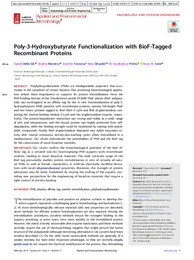Por favor, use este identificador para citar o enlazar este ítem:
https://hdl.handle.net/11000/4586
Poly-3-Hydroxybutyrate Functionalization with BioF-Tagged Recombinant Proteins
Título :
Poly-3-Hydroxybutyrate Functionalization with BioF-Tagged Recombinant Proteins |
Autor :
Bello Gil, Daniel
Maestro García-Donas, Beatriz
Fonseca, Jennifer
Dinjaski, Nina
Prieto, M. Auxiliadora
Sanz, Jesús M. |
Departamento:
Departamentos de la UMH::Bioquímica y Biología Molecular |
Fecha de publicación:
2017-11-01 |
URI :
http://hdl.handle.net/11000/4586 |
Resumen :
Polyhydroxyalkanoates (PHAs) are biodegradable polyesters that accumulate
in the cytoplasm of certain bacteria. One promising biotechnological application
utilizes these biopolymers as supports for protein immobilization. Here, the
PHA-binding domain of the Pseudomonas putida KT2440 PhaF phasin (BioF polypeptide)
was investigated as an affinity tag for the in vitro functionalization of poly-3-
hydroxybutyrate (PHB) particles with recombinant proteins, namely, full-length PhaF and two fusion proteins tagged to BioF (BioF–C-LytA and BioF–_-galactosidase, containing the choline-binding module C-LytA and the _-galactosidase enzyme, respectively).
The protein-biopolyester interaction was strong and stable in a wide range
of pHs and temperatures, and the bound protein was highly protected from selfdegradation, while the binding strength could be modulated by coating with amphiphilic compounds. Finally, BioF–_-galactosidase displayed very stable enzymatic activity after several continuous activity-plus-washing cycles when immobilized in a minibioreactor. Our results demonstrate the potentialities of PHA and the BioF tag for the construction of novel bioactive materials.
|
Palabras clave/Materias:
PHB
phasins
affinity tag
protein immobilization
polyhydroxyalkanoates |
Área de conocimiento :
Biología |
Tipo de documento :
info:eu-repo/semantics/article |
Derechos de acceso:
info:eu-repo/semantics/openAccess |
DOI :
https://doi.org/10.1128/AEM.02595-17 |
Aparece en las colecciones:
Instituto de Biología Molecular y Celular
|
 La licencia se describe como: Atribución-NonComercial-NoDerivada 4.0 Internacional.
La licencia se describe como: Atribución-NonComercial-NoDerivada 4.0 Internacional.
 La licencia se describe como: Atribución-NonComercial-NoDerivada 4.0 Internacional.
La licencia se describe como: Atribución-NonComercial-NoDerivada 4.0 Internacional.
.png)
